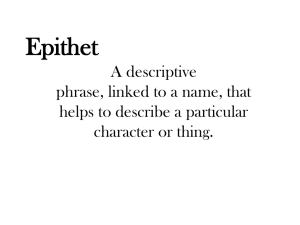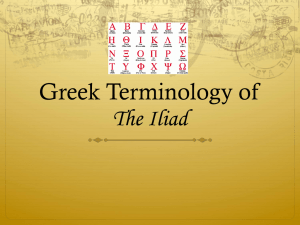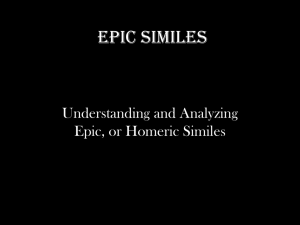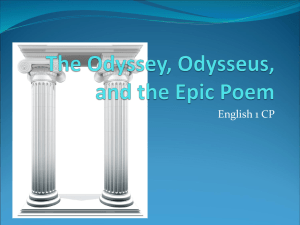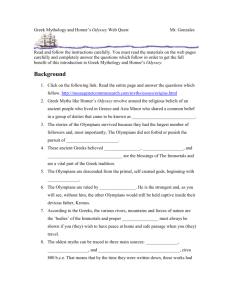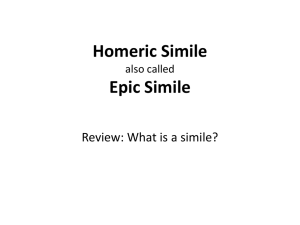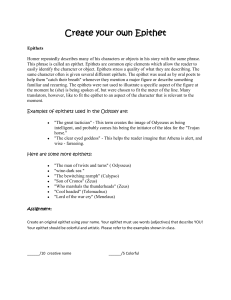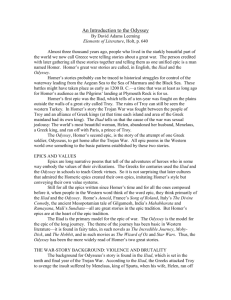The Language of Homer
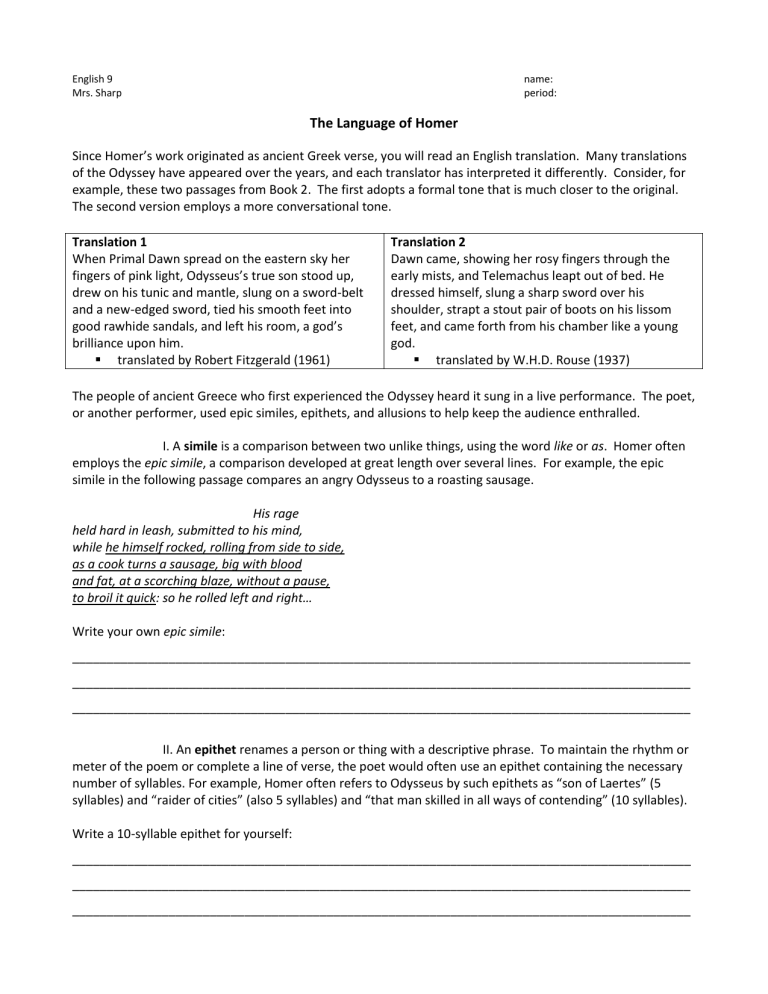
English 9
Mrs. Sharp name: period:
The Language of Homer
Since Homer’s work originated as ancient Greek verse, you will read an English translation. Many translations of the Odyssey have appeared over the years, and each translator has interpreted it differently. Consider, for example, these two passages from Book 2. The first adopts a formal tone that is much closer to the original.
The second version employs a more conversational tone.
Translation 1
When Primal Dawn spread on the eastern sky her fingers of pink light, Odysseus’s true son stood up, drew on his tunic and mantle, slung on a sword-belt and a new-edged sword, tied his smooth feet into good rawhide sandals, and left his room, a god’s brilliance upon him.
translated by Robert Fitzgerald (1961)
Translation 2
Dawn came, showing her rosy fingers through the early mists, and Telemachus leapt out of bed. He dressed himself, slung a sharp sword over his shoulder, strapt a stout pair of boots on his lissom feet, and came forth from his chamber like a young god.
translated by W.H.D. Rouse (1937)
The people of ancient Greece who first experienced the Odyssey heard it sung in a live performance. The poet, or another performer, used epic similes, epithets, and allusions to help keep the audience enthralled.
I. A simile is a comparison between two unlike things, using the word like or as. Homer often employs the epic simile, a comparison developed at great length over several lines. For example, the epic simile in the following passage compares an angry Odysseus to a roasting sausage.
His rage held hard in leash, submitted to his mind, while he himself rocked, rolling from side to side, as a cook turns a sausage, big with blood and fat, at a scorching blaze, without a pause, to broil it quick: so he rolled left and right…
Write your own epic simile:
__________________________________________________________________________________________
__________________________________________________________________________________________
__________________________________________________________________________________________
II. An epithet renames a person or thing with a descriptive phrase. To maintain the rhythm or meter of the poem or complete a line of verse, the poet would often use an epithet containing the necessary number of syllables. For example, Homer often refers to Odysseus by such epithets as “son of Laertes” (5 syllables) and “raider of cities” (also 5 syllables) and “that man skilled in all ways of contending” (10 syllables).
Write a 10-syllable epithet for yourself:
__________________________________________________________________________________________
__________________________________________________________________________________________
__________________________________________________________________________________________
III. An allusion is a reference to a literary or historical person, place, event, or composition.
For example, when Telemachus, Odysseus’s son, beholds the palace of Menelaus, he exclaims, “This is the way the court of Zeus must be.” Every listener in Greece immediately understood the allusion to Zeus, the ruler of the gods. Allusions are found in all forms of media: television, books, songs, speeches, etc.
Write down an allusion that you have seen or heard somewhere:
__________________________________________________________________________________________
__________________________________________________________________________________________
What is the difference between an allusion and an illusion?
__________________________________________________________________________________________
__________________________________________________________________________________________
Reading the Epic
Any journey through the Odyssey offers the reader a complex experience. On one level, Homer provides an action-packed narrative that makes us eagerly anticipate each thrilling step in the adventure. On another level, readers can analyze and appreciate the poem as a work of art. The following strategies can help you navigate your own voyage.
Reading the Epic as Narrative
Pay close attention to the changing narrators. Who is telling the story at a given point? Consider the ways in which different narrators deepen your understanding of characters and events. It would help
to review the following topics: o first person narration ___________________________________________________________ o third-person limited narration ____________________________________________________ o omniscient narration ___________________________________________________________ o unreliable narrator _____________________________________________________________
Visualize the setting and the action by observing key details in the text. It would help to review the following topics: o setting _______________________________________________________________________ o imagery ______________________________________________________________________
Why might imagery be so useful in a poem spoken aloud to a group?
______________________________________________________________________
______________________________________________________________________
Note major events and conflicts and try to predict their outcomes. Use a chart like the one shown below to track characters, including gods and goddesses. Characterize characters as friends or foes, and explain how they help or hinder Odysseus’s efforts.
Characters Who Help
Goddess Athena pleads with Zeus to help Odysseus escape from Calypso’s island.
Characters Who Hinder
The god Poseidon stirs up powerful storms that cause problems for Odysseus and his crew.
Additionally, it would help to review the following topics: o internal conflicts _______________________________________________________________ o external conflicts ______________________________________________________________ o direct characterization __________________________________________________________ o indirect characterization ________________________________________________________ o motivation ___________________________________________________________________
Reading the Epic as Poetry
Read the epic aloud. Listen for sound devises such as alliteration, meter, and rhyme, and notice how they reflect and enhance meaning. o Alliteration: ___________________________________________________________________ o Meter: ______________________________________________________________________ o Rhyme: ______________________________________________________________________
Follow punctuation closely, and remember that the end of a line does not indicate the end of a thought.
Consider how imagery and figurative language, including epic similes, reveal characters and events.
Note all allusions and epithets.
Reading the Epic within the Context of Its Time
Look closely at how Odysseus behaves. What character traits does he display? What do these traits tell you about the values of the time? o Name a modern-day hero (real-life or fictional) and discuss how that hero shows something that is important in our society.
_____________________________________________________________________________
_____________________________________________________________________________
_____________________________________________________________________________
_____________________________________________________________________________
Draw upon your own prior knowledge of ancient Greek civilization and history. What events and customs would have influenced Homer?
Remember that the Greeks of Homer’s time believed that the gods took an active interest in human affairs. (In fact, the gods themselves behaved very much like humans.) How do such religious beliefs influence the epic?
